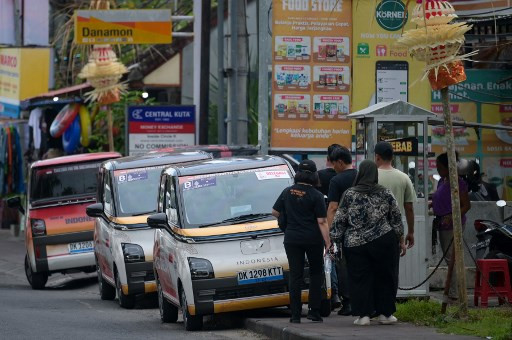Popular Reads
Top Results
Can't find what you're looking for?
View all search resultsPopular Reads
Top Results
Can't find what you're looking for?
View all search resultsIndonesia doubles down on EV incentives to hit tipping point
EV two-wheelers key to speeding up EV adoption: Official.
Change text size
Gift Premium Articles
to Anyone
T
he government has stressed the importance of incentives for the purchase of electric vehicles (EVs) to reach the critical mass needed for further growth.
"The very first thing [to do in the EV industry] is to get traction. We need 10 percent of all new vehicles sold in a year to be electric," said Septian Hario Seto, undersecretary at the Office of the Coordinating Minister for Maritime Affairs and Investment.
Speaking at the Mandiri Investment Forum in Jakarta on Wednesday, Seto said he expected EVs to account for 5 percent of total vehicle sales this year, and twice that share in 2024.
That meant 600,000 electric motorcycles and 100,000 electric cars needed to be sold next year, he explained.
The burgeoning local market is deemed an important showcase for Indonesia's effort to attract more investors to develop the country's EV ecosystem.
Seto also expressed optimism that EVs made in Indonesia, beyond meeting local demand, could also be exported to other countries, facilitated by the increasing number of free trade agreements signed in the region.
Alexander Wachtmeister, managing director and senior partner at Boston Consulting Group (BCG), mentioned at the same event that EVs accounted for 8.3 percent of global car sales in 2021.
The trend was pushed by regulatory efforts, such as the European Union's deal in 2019 and China's ambition to cut dependency on Western automakers.
It was also supported by major vehicle manufacturers’ plans to stop the development of internal combustion engines (ICEs), as it would be too expensive to develop two different engines, and by consumers’ awareness about environmental issues.
By 2030, S&P has forecast, one in four new passenger cars sold will be an EV. The firm has upheld that long-term prediction despite short-term risks to the momentum stemming from the end of Chinese subsidies, Europe’s energy crisis and recession fears in the United States.
"We already lost to Thailand in terms of production capacity of ICE-based vehicles. If we lose again on EV, that's it. Indonesia will only be the market for Thailand's EVs," Seto warned.
Electric motorcycles to play key role
Motorcycles are the most popular vehicle in Indonesia. In total, there are 118 million motorcycles in the country, with 6.5 million new ones being sold every year.
Hence, the official added, focusing on electric motorcycles was the key to speeding up EV adoption.
Seto recommended that manufacturers seek to entice new customers by not including the battery in the electric motorcycle purchase but instead offering a battery-swap scheme and charging customers a subscription fee.
"That way, you can lower the purchase price by Rp 4.5 million [US$302]. Together with the government subsidy, the final price of the electric motorcycle may then be only Rp 18 million. That is similar to the price of an entry-level conventional motorcycle," stated Seto.
However, the strategy is not without caveats, as developing battery swap networks also requires investment. Seto raised the idea of providing funding for state-owned enterprises such as PLN or Pertamina to establish the supply chain for battery swaps.
Another way to reduce the transition cost to electric motorcycles is by converting conventional two-wheelers to electric.
As reported in December, the Indonesian government is finalizing an incentive scheme for the purchase of EVs produced inside the country, guided by regulations in countries with higher EV adoption.
Read also: Govt details purchase incentives for locally produced EVs
Industry Minister Agus Gumiwang Kartasasmita stated at the time that the incentive would vary for different kinds of vehicles, detailing that each fully electric car was lined up for Rp 80 million worth of subsidies, while each electric-motorcycle purchase would be eligible for around Rp 8 million.
President Joko “Jokowi” Widodo even went one step further by instructing all state institutions and their regional offices to shift to EVs, and allowing the usage of state funds to finance most of the transition.










